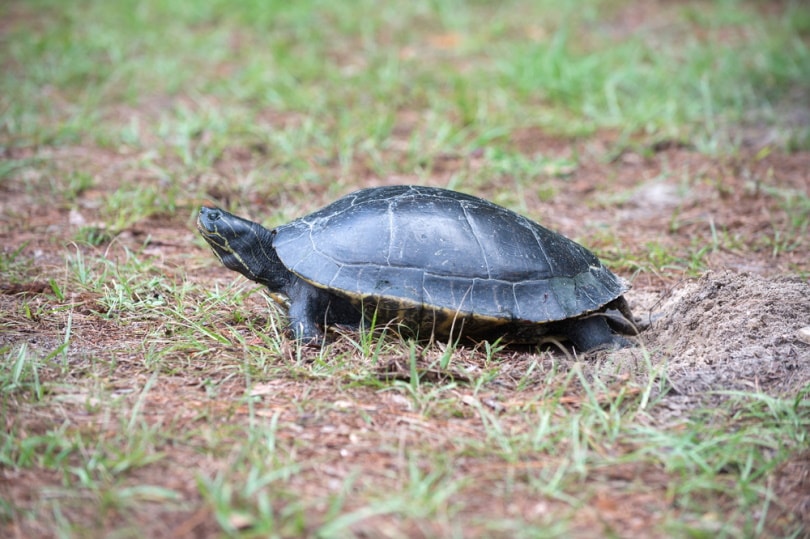
Click to Skip Ahead
Turtles can run, though not very fast! The average speed of a turtle on land is between 3 and 4 mph. Though this may seem quite slow at first glance, 3 mph is also the average person’s walking speed.
There are a few reasons why turtles take it easy on land, but this doesn’t mean they can’t move fast. The Leatherback Sea Turtle is the fastest known aquatic reptile when it glides in the water at speeds of up to 22 mph.
In this article, we’ll take a closer look at these fascinating, ancient creatures to get a better understanding of why they don’t run fast.
Why Are Turtles Slow?
All animals evolve characteristics that aid in their survival. Creatures that run fast have evolved the ability to do so to help them escape predators, hunt prey, or a mix of both. As for turtles, they have survived for thousands of years, so their inability to run fast has not impeded their existence!

Protective Shield
Turtles have protective shields that are excellent at defending them against predators. One of their excellent abilities is that of retracting their protruding body parts into the shell to protect themselves. Sea turtles lack the ability to retract into their shell, but they do have thick leathery skin that does give them a measure of protection.
With this protective shield, turtles don’t usually need to run away from predators. Turtle eggs and hatchlings are at the most risk of being preyed on.
Heavy Load
While a turtle’s shell is excellent at keeping them safe, it’s also proportionally quite heavy. Their shells often weigh around a quarter to one-third of their entire body weight. In addition to having to carry around this incredible burden (it’s like asking a 150-pound person to carry a 50-pound backpack), turtles have tiny, webbed feet that are made for swimming, and trying to stretch them out far enough out of their shell in order to run can be awkward.

Lazy Eaters
Perhaps it’s not fair to say that turtles are lazy eaters. More accurately, they feed on readily available insects and vegetation. On land, they have no need to lunge, run, or otherwise rush to catch their food.
Beneath the waves, however, things look a little different. Turtles are agile swimmers, and in the water, they have the chance to catch and eat small fish.
Slow Metabolism
Turtles have very slow metabolisms, which probably contributes to their long lifespans. This slow metabolism is important for conserving energy, and it’s critical to their ability to survive for long periods underwater before reemerging for oxygen. Running quickly would simply expend too much energy—too many calories—and therefore wouldn’t benefit a turtle.
Are Turtles Faster Than Tortoises?
It’s easy to think that perhaps tortoises, since they are land-dwellers, might be faster sprinters than turtles—this isn’t accurate! Turtles are faster than tortoises. The fastest tortoise, Bertie, was recorded to run at around 0.62 mph, while the fastest turtle on land sprints at around 3 mph.
Speed Comparison
| Species | Speed |
| Leatherback Sea Turtle | 22 mph (water) |
| Alligator | 35 mph (land) |
| Galapagos Tortoise | 0.16 mph (land) |
| Cheetah | 50–62 mph (land) |
| Average person | 3 mph (walking) |
Conclusion
Though turtles can sprint when startled, it doesn’t come naturally to them. Turtles have not had the evolutionary need to develop into fast runners on land. Their shell protects them from most predators, while they’re quite happy to lazily forage from vegetation, without the need to hunt, lunge, or chase.
Beneath the waves, however, turtles are graceful swimmers who display an impressive level of agility!
Featured Image Credit: Brian A Wolf, Shutterstock







